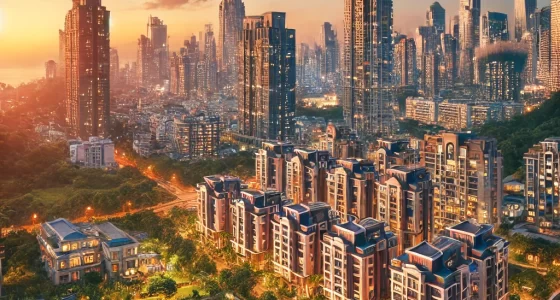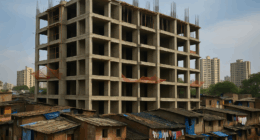By Manju Yagnik
In recent years, India’s infrastructure network has witnessed significant improvements, with far-reaching implications for the real estate sector. These enhancements have not only strengthened regional accessibility but also created new opportunities while enhancing the overall quality of life in these areas. Better transportation systems, including highways, bridges, and public transportation, have the potential to drive increased demand for real estate within a given region. Large-scale infrastructure projects, such as the ambitious Delhi Mumbai Expressway, are poised to revolutionize the landscape of Indian real estate, trade, and transportation.
The impact of infrastructure on housing development is multifaceted. Improved infrastructure simplifies the process of launching new housing projects, ultimately increasing the housing supply within a community. A more efficient transportation system streamlines the conveyance of employees, equipment, and building materials to construction sites, subsequently reducing the cost of constructing new dwellings. This cost reduction translates into a higher overall supply of housing in the region.
Moreover, infrastructure development can lead to a surge in property values due to heightened demand, particularly in previously overlooked or underserved locations. An introduction of a new motorway or an enhancement of public transportation accessibility can make commuting more convenient, resulting in increased demand for homes and businesses in proximity. The creation of new public spaces and amenities further contributes to the overall appeal of a region, driving up local real estate prices.
The impact of infrastructure development extends beyond economic factors. New public spaces, such as parks and community centers, significantly enhance the overall quality of life, rendering a locality more attractive to potential buyers and tenants. Furthermore, these infrastructure projects can stimulate employment opportunities and foster economic growth, which, in turn, encourages real estate investment. The role of new infrastructure projects in catalyzing the growth and potential of the real estate industry cannot be underestimated.
As India experiences growth and urbanization, the emergence of new urban areas and population centers is a natural consequence of increasing infrastructure development. These metropolitan centers stimulate demand for residential real estate as well as for businesses, including stores, malls, and educational institutions. An enhanced business environment fosters ease of doing business, making the nation more appealing to foreign businesses seeking to open offices and production facilities in India.
Infrastructure development is particularly transformative for smaller cities in India. By improving the infrastructure in these regions, the stage is set for the proliferation of start-ups and the expansion of businesses. This, in turn, contributes to increasing the availability, raising the quality, and decreasing the cost of homes in these areas, ultimately having a substantial impact on the housing market.
To provide a specific illustration of the potential impact of infrastructure development, consider the Delhi Mumbai Expressway project. As one of the most ambitious infrastructure undertakings in India, it holds the promise of reshaping not only the nation’s transportation landscape but also the trajectory of real estate and trade. This mega-project is expected to enhance accessibility, reduce commuting times, and create a corridor of growth and opportunity. As a result, regions connected by this expressway are likely to experience a surge in real estate development, attracting businesses and industries looking to capitalize on the newfound accessibility.
We understand the profound interplay between infrastructure development and real estate growth. We have consistently focused on strategically locating our projects to align with infrastructure developments, ensuring that our properties benefit from increased accessibility and connectivity. Our projects are designed with a keen understanding of the evolving needs of urban living, taking into account the convenience, accessibility, and lifestyle preferences of our customers.
The relationship between infrastructure development and real estate growth is symbiotic and dynamic. Infrastructure projects have the power to transform regions, create new opportunities, and enhance the overall quality of life, making these areas more attractive for both residential and commercial purposes. As India continues to invest in its infrastructure, the real estate sector stands to gain immensely, and it is crucial for property owners and investors to recognize and leverage this transformative potential. The future of Indian real estate is intricately intertwined with the nation’s infrastructure development, offering a promising and exciting landscape for all stakeholders involved.
Manju Yagnik is the Vice Chairperson Nahar Group
Also Read: How Sustainable real estate practices are transforming the industry








